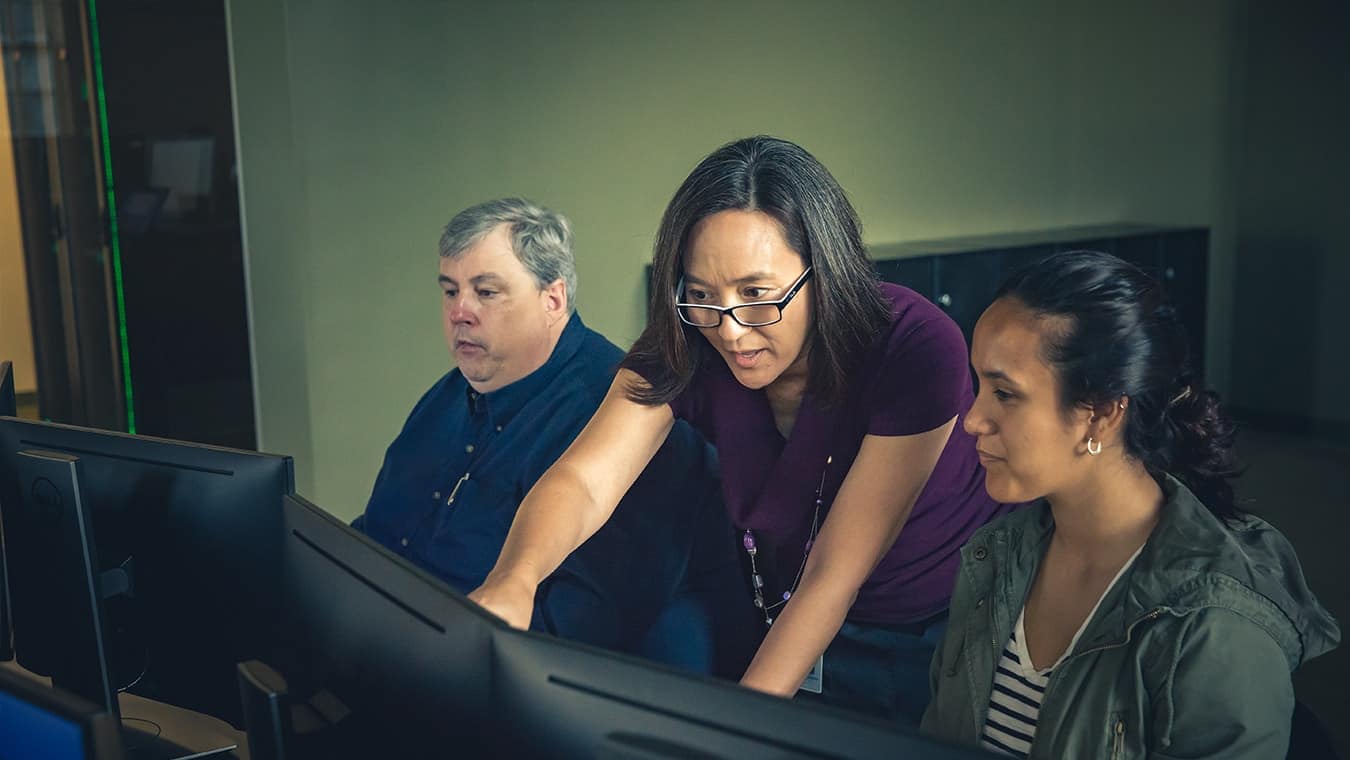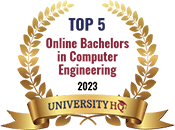
B.S. in Computer Engineering
Engineer Your Future
You love the challenge of problem-solving. Regent’s Bachelor of Science in Computer Engineering is a highly marketable degree that will prepare you to solve complex problems by applying principles of engineering, science, and mathematics. Study the fundamentals in systems thinking, software engineering, computer programming, and more—all taught from a Christian worldview.
DEVELOP YOUR SKILLS
Design IT solutions by understanding the relationship between computer hardware and software systems.
BUILD ON A STRONG FOUNDATION
Anchor your knowledge and skill on Christian principles and values.
LEARN FROM THE BEST
Be mentored by faculty in Virginia Beach who hold the highest degrees in their field.
ALIGN YOURSELF WITH EXCELLENCE
Regent has been ranked among Top National Universities by the U.S. News & World Report for four years (2019, 2020, 2022 and 2023). Our programs have also ranked as the #1 Best Online Bachelor's Programs in Virginia 11 years in a row (2013-2023). We have also been recognized as a Military Friendly Top 5 School by Military Friendly®, 2023-24, and among the Top 10 Best for Vets Colleges: Online & Nontraditional by Military Times, 2020. Experience the Regent difference through the Bachelor of Science in Computer Engineering degree program.
On completing the B.S. in Computer Engineering program, you can:
- Conduct experiments, analyze data, and interpret results
- Assess the impact of engineering solutions
- Design and engineer all aspects of modern computing systems
Career Opportunities:
- Software Developer
- Computer Hardware Engineer
- IT Systems Administrator
- Robotic Engineer
- Engineer Researcher
- Product Designer
Step 1: Apply to Regent University
Submit your application using the Regent University Online Application.
Note: If you are unable to complete our application due to a disability, please contact our Admissions Office at 757.352.4990 or admissions@regent.edu and an admissions representative will provide reasonable accommodations to assist you in completing the application.
Step 2: Submit Your Unofficial Transcripts
Submit your unofficial high school or college transcripts to regent.edu/items.
Upon submitting your application, you will receive an email requesting authorization for Regent University to obtain your official transcripts from your U.S. degree-granting institution. International transcripts must be evaluated by a NACES, AACRAO or NAFSA approved agency.
Step 3: Submit Your Government-Issued ID
To ensure academic integrity, Regent University requires a copy of a government-issued ID. Please submit a scanned copy or photograph of it to regent.edu/items.
Step 4: Submit Your FAFSA
Complete your Free Application for Federal Student Aid (FAFSA) at studentaid.gov Regent's school code is 030913.
Please feel free to contact the Office of Admissions at 757.352.4990 or admissions@regent.edu should you have any further questions about the application process.
Note: All items submitted as part of the application process become the property of Regent University and cannot be returned.
| Degree | Tuition Block Rate Per Semester | Credit Hours Per Semester | Tuition Rate Per Year |
|---|---|---|---|
| Students taking on-campus classes (fall & spring semesters) | $9,975 | 12 - 18 | $19,950 |
| Degree | Tuition Cost Per Credit Hour | Average Credit Hours Per Semester | Average Tuition Per Semester |
|---|---|---|---|
| Students taking on-campus classes (fall & spring semesters) | $665 | Under 12 | $7,980 |
| Students taking on-campus classes (fall & spring semesters) | $665 | Over 18 | $11,970 |
| Students taking on-campus classes (summer semester) | $665 | N/A | $1,995+ |
Student Fees Per Semester
| University Services Fee (On-Campus Students) | $850 (Fall & Spring) $700 (Summer) |
Housing Fees » | Military Admissions & Aid » | Cost of Attendance »
| Degree | Tuition Cost Per Credit Hour | Average Credit Hours Per Semester | Average Tuition Per Semester |
|---|---|---|---|
| Part-Time Students (3-11 Credit Hours Per Semester) | $450 | 6 | $2,700 |
| Full-Time Students (12+ Credit Hours Per Semester) | $395 | 12 | $4,740 |
Student Fees Per Semester
| University Services Fee (Online Students) | $700 |
| Degree | Tuition Block Rate Per Semester | Credit Hours Per Semester | Tuition Rate Per Year |
|---|---|---|---|
| Students taking on-campus classes (fall & spring semesters) | $9,493 | 12 - 18 | $18,986 |
| Degree | Tuition Cost Per Credit Hour | Average Credit Hours Per Semester | Average Tuition Per Semester |
|---|---|---|---|
| Students taking on-campus classes (fall & spring semesters) | $630 | Under 12 | $7,560 |
| Students taking on-campus classes (fall & spring semesters) | $630 | Over 18 | $11,340 |
| Students taking on-campus classes (summer semester) | $630 | N/A | $1,890+ |
Student Fees Per Semester
| University Services Fee (On-Campus Students) | $850 (Fall & Spring) $700 (Summer) |
Housing Fees » | Military Admissions & Aid » | Cost of Attendance »
| Degree | Tuition Cost Per Credit Hour | Average Credit Hours Per Semester | Average Tuition Per Semester |
|---|---|---|---|
| Part-Time Students (3-11 Credit Hours Per Semester) | $450 | 6 | $2,700 |
| Full-Time Students (12+ Credit Hours Per Semester) | $395 | 12 | $4,740 |
Student Fees Per Semester
| University Services Fee (Online Students) | $700 |
Computer Engineering Program Learning Outcomes
- An ability to identify, formulate, and solve complex engineering problems by applying principles of engineering, science, and mathematics.
- An ability to apply the engineering design process to produce solutions that meet specified needs with consideration for public health and safety, and global, cultural, social, environmental, economic, and other factors as appropriate to the discipline.
- An ability to develop and conduct appropriate experimentation, analyze and interpret data, and use engineering judgment to draw conclusions.
- An ability to communicate effectively with a range of audiences.
- An ability to recognize ethical and professional responsibilities in engineering situations and make informed judgments, which must consider the impact of engineering solutions in global, economic, environmental, and societal contexts.
- An ability to recognize the ongoing need to acquire new knowledge, to choose appropriate learning strategies, and to apply this knowledge.
- An ability to function effectively as a member or leader of a team that establishes goals, plans tasks, meets deadlines, and creates a collaborative and inclusive environment.
- An ability to recognize and apply relevant perspectives from a Biblical worldview to engineering situations.




